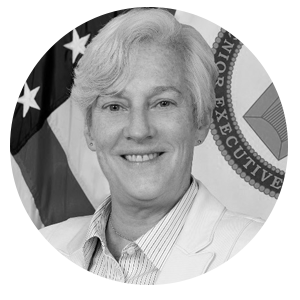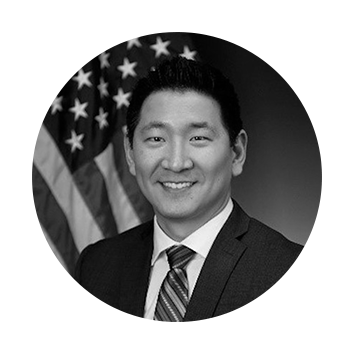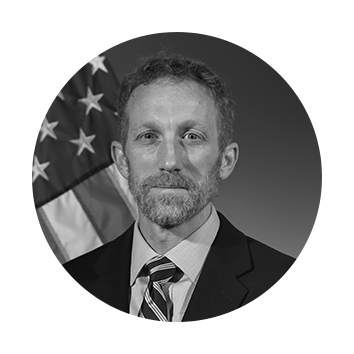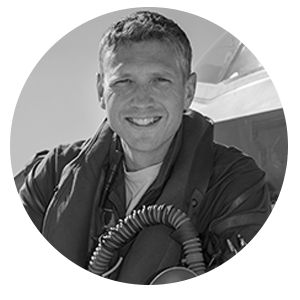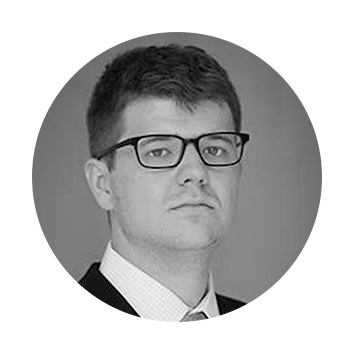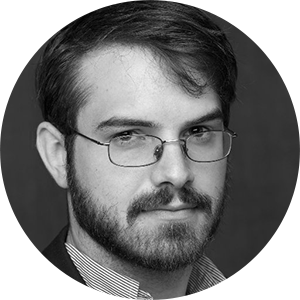Speakers
May 6, 2021
July 29, 2021
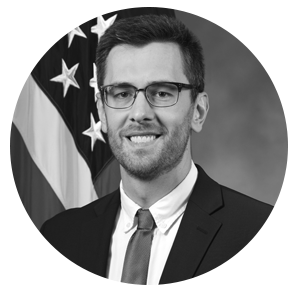
Gregory C. Allen
Director of Strategy and Policy, Joint Artificial Intelligence Center
Department of Defense
Read More
Gregory C. Allen
Director of Strategy and Policy, Joint Artificial Intelligence Center
Department of Defense
Gregory C. Allen is the Director of Strategy and Policy at the Department of Defense Joint Artificial Intelligence Center (JAIC). At the JAIC, Mr. Allen advises on development, implementation, and assessment of the DoD AI Strategy and is responsible managing the JAIC’s annual strategic planning process. He ensures the development and reform of policies and processes that accelerate the DoD’s adoption of AI for competitive military advantage.
Before joining the JAIC, Mr. Allen was an Adjunct Senior Fellow at the Center for a New American Security (CNAS) where he focused on the intersection of Artificial Intelligence, cybersecurity, robotics, space, and national security. Mr. Allen also previously served as the head of market and competitive strategy at Blue Origin, a space technology manufacturer.
Mr. Allen holds a joint MPP/MBA degree from the Harvard Kennedy School of Government and Harvard Business School.

Ylli Bajraktari
Executive Director
National Security Commission on Artificial Intelligence
Read More
Ylli Bajraktari
Executive Director
National Security Commission on Artificial Intelligence
Mr. Yll Bajraktari is the Executive Director of the National Security Commission on Artificial Intelligence. Prior to joining NSCAI, he served as Chief of Staff to the National Security Advisor LTG H.R. McMaster, held a variety of leadership roles for former Deputy Secretary of Defense Robert Work, and served as Special Assistant to the Chairman of the Joint Chiefs of Staff, General Dempsey. Originally joining the Department of Defense in 2010, he served in the Office of the Undersecretary for Policy as a country director for Afghanistan, and later India. Mr. Bajraktari is the recipient of the Department of Defense Distinguished Civilian Service Medal – the highest award given to career DoD civilian employees.

Steve Chien
Senior Research Scientist, and Technical Group Supervisor of the Artificial Intelligence Group
NASA Jet Propulsion Laboratory
Read More
Steve Chien
Senior Research Scientist, and Technical Group Supervisor of the Artificial Intelligence Group
NASA Jet Propulsion Laboratory
Dr. Steve Chien is JPL Fellow, Senior Research Scientist, and Technical Group Supervisor of the Artificial Intelligence Group and in the Mission Planning and Execution Section at the Jet Propulsion Laboratory, California Institute of Technology where he leads efforts in automated planning and scheduling for space exploration. Dr. Chien was previously Adjunct Faculty with the Department of Computer Science of the University of Southern California, and a Research Scientist at the Joint Institute for Regional Earth System Science & Engineering and a Visiting Scholar with the Department of Computer Science of the University of California at Los Angeles. He holds a B.S. with Highest Honors in Computer Science, with minors in Mathematics and Economics, M.S., and Ph.D. degrees in Computer Science, all from the University of Illinois.
He is a founder of the International Workshop on Planning and Scheduling for Space held every other year from 1997 onward and was the Chair or Co-chair of numerous workshops. He is former chair of the AIPS Executive Council (2000-2002), was a founding member of the ICAPS Executive Council (2002-2006), and was founding President of the ICAPS Executive Council 2002-2004. He was also a Councilor for the American Association for Artificial Intelligence (2003-2006)
Dr. Chien was a recipient of the 1995 Lew Allen Award for Excellence, JPLs highest award recognizing outstanding technical achievements by JPL personnel in the early years of their careers. In 1997, he received the NASA Exceptional Achievement Medal for his work in research and development of planning and scheduling systems for NASA. He is the Team Lead for the ASPEN Planning System , which received Honorable Mention in the 1999 Software of the Year Competition and was a contributor to the Remote Agent System which was a co-winner in the same 1999 competition. In 2000, he received the NASA Exceptional Service Medal for service and leadership in research and deployment of planning and scheduling systems for NASA. He is the Principal Investigator for the Autonomous Sciencecraft Experiment which is a co-winner of the 2005 NASA Software of the Year Award. In 2007, he received the NASA Exceptional Achievement Medal for outstanding technical accomplishments in the development of the Autonomous Sciencecraft deployed on the Earth Observing One Mission and the development of the Earth Observing Sensorweb. In 2011 He was awarded the innaugural AIAA Intelligent Systems Award, for his contributions to Spacecraft Autonomy. In 2011, he was the team co-lead for the Sensorweb Toolbox team, which was awarded Honorable mention in the 2011 NASA Software of the Year Competition. In 2015 He was awarded a JPL Magellan Award as well as the NASA Exceptional Achievement Medal for his contributions to automated science scheduling for ESA's Rosetta mission.
Dr. Chien has supported the Office of the Undersecretary of Defense for Research and Engineering, Defense Science Board, and Air Force Scientific Advisory Board. In 2018, Dr. Chien was appointed to the National Security Commission on Artificial Intelligence.
Dr. Chien has presented invited seminars on planning, scheduling, and resource allocation as well as on spacecraft autonomy and autonomous systems. He has authored numerous publications. in these areas, and has served as a consultant to several multinational corporations in these areas. His current research interests lie in the areas of: planning and scheduling, machine learning, operations research, and decision theory.

Oki Mek
Chief Artificial Intelligence Officer
Department of Health & Human Services
Read More
Oki Mek
Chief Artificial Intelligence Officer
Department of Health & Human Services
Learn more here.
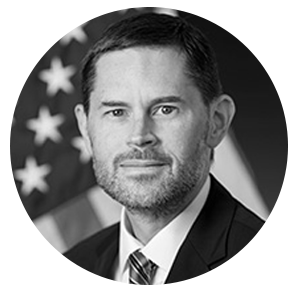
Dr. Matthew Turek
Acting Deputy Director, Information Innovation Office
DARPA
Read More
Dr. Matthew Turek
Acting Deputy Director, Information Innovation Office
DARPA
Dr. Matt Turek joined DARPA's Information Innovation Office (I2O) as a program manager in July 2018, and was named Acting Deputy Director of I2O in June 2021. His research interests include computer vision, machine learning, artificial intelligence, and their application to problems with significant societal impact.
Prior to his position at DARPA, Turek was at Kitware, Inc., where he led a team developing computer vision technologies. His research focused on multiple areas, including large scale behavior recognition and modeling; object detection and tracking; activity recognition; normalcy modeling and anomaly detection; and image indexing and retrieval. Turek has made significant contributions to multiple DARPA and Air Force Research Lab (AFRL) efforts and has transitioned large scale systems for operational use. Before joining Kitware, Turek worked for GE Global Research, conducting research in medical imaging and industrial inspection.
Turek holds a Doctor of Philosophy in computer science from Rensselaer Polytechnic Institute, a Master of Science in electrical engineering from Marquette University, and a Bachelor of Science in electrical engineering from Clarkson University. His doctoral work focused on combinatorial optimization techniques for computer vision problems. Turek is a co-inventor on several patents and co-author of multiple publications, primarily in computer vision.

Dr. Xiaoming Liu
Foundation Professor, Department of Computer Science and Engineering
Michigan State University
Read More
Dr. Xiaoming Liu
Foundation Professor, Department of Computer Science and Engineering
Michigan State University
Dr. Xiaoming Liu is the MSU Foundation Professor at the Department of Computer Science and Engineering of Michigan State University (MSU). He received Ph.D. degree from Carnegie Mellon University in 2004. Before joining MSU in 2012 he was a research scientist at General Electric (GE) Global Research. He works on computer vision, machine learning, and biometrics especially on 3D vision, and face related analysis. Since 2012 he helps to develop a strong computer vision area in MSU who is ranked top 15 in US according to the 5-year statistics at csrankings.org. He received the 2018 Withrow Distinguished Scholar Award from MSU. He has been Area Chairs for numerous conferences, including CVPR, ICCV, ECCV, ICLR, NeurIPS, ICML, the Co-Program Chair of BTAS’18, WACV’18, and AVSS’21 conferences, and Co-General Chair of FG’23 conference. He is an Associate Editor of Pattern Recognition Letters, Pattern Recognition, and IEEE Transaction on Image Processing. He has authored more than 150 scientific publications, and has filed 29 U.S. patents. His work has been cited over 14000 times according to Google Scholar, with an H-index of 60. He is a fellow of IAPR. More information of Dr. Liu’s research can be found at http://cvlab.cse.msu.edu


Dr. Rafael ‘Tico’ Ballagas
Senior Manager of Omnicept AI, HP Labs
HP
Dr. Rafael ‘Tico’ Ballagas is a Senior Manager of Omnicept AI at HP Labs. His work explores how AI transforms the way we interact with computers, including pioneering new types of brain-computer interfaces by understanding the links between peripheral physiology and state of mind. He leads the team responsible for building the inference engines for the Omnicept product (see http://hp.com/omnicept). Prior to HP, Tico was the co-founder of Kindoma, the award-winning creator of the mobile communication services around shared activities, like reading and drawing, that help families meaningfully connect with children when they can’t be together. His work consistently garners worldwide media attention with articles featured in the New York Times, The Guardian, and USA Today. He earned his Doctorate in computer science at RWTH Aachen University in Germany, and he also has degrees from Georgia Institute of Technology and Stanford University.


Dr. Thomas Boggs
Chief AI Architect, AI/ML Accelerator
Leidos
Dr. Boggs is the Chief AI Architect for the Leidos AI/ML Accelerator, where he provides oversight on strategic AI-related R&D efforts. His work focuses on the development, assessment, and deployment of Deep Learning capabilities into production environments. His professional background includes over 20 years of experience in AI/ML, modeling & simulation, and remote sensing for government, DoD, and IC customers. He received a PhD in Computational Sciences & Informatics and a Master’s degree in Applied Physics from George Mason University. He received a Master’s degree in Civil Engineering and bachelor’s degrees in Philosophy and Physics from Virginia Tech.


Jeri Culp
Workstations R&D, Manager of Data Science
HP
Jeri leads the Data Science Business in the Advanced Compute and Solutions group at HP Inc. In this role, Jeri is responsible for end to end leadership, driving breakthrough innovations, bringing solutions to market, and Business Development for Data Science. Jeri joined HP in 1990 to work on software solutions and usability. In her 32 years at HP, Jeri has worked in a wide range of businesses focusing on software and image analysis and is now focusing on enabling the use of AI at the edge.


Brianna Havlik
Head of XR Software
HP
Brianna Havlik is the leader of the XR SW team delivering HP Omnicept, a software solution utilizing AI to create more personalized VR experiences. She has a passion for people development and project execution which she is thankful to be utilizing in the impactful and fun field of VR.


Bob Pette
Vice President of Professional Visualization
NVIDIA
Bob Pette is the vice president of Professional Visualization at NVIDIA.
Pette, who joined NVIDIA in 2009, brings more than 25 years of experience in visualization, high-performance computing, and multi-touch technologies to his role. His responsibilities include NVIDIA platforms and technologies such as Quadro GPUs, advanced rendering technologies, and professional virtual reality solutions.
After leaving NVIDIA in 2015, Pette was CEO of Perceptive Pixel, where he successfully steered the company through its acquisition by Microsoft. He was also CEO of TouchShare, where he transformed the multi-touch hardware company to a SaaS software company focusing on geospatial collaboration and visualization. He rejoined NVIDIA in 2015.
Prior to his roles at NVIDIA, Pette held executive management roles at Silicon Graphics.
Pette earned a Bachelor of Science in mathematics from the University of Tampa, and a Bachelor of Science in aerospace engineering from the Georgia Institute of Technology.


Patrick Tucker
Technology Editor
Defense One
Patrick Tucker is technology editor for Defense One. He’s also the author of The Naked Future: What Happens in a World That Anticipates Your Every Move? (Current, 2014). Previously, Tucker was deputy editor for The Futurist for nine years. Tucker has written about emerging technology in Slate, The Sun, MIT Technology Review, Wilson Quarterly, The American Legion Magazine, BBC News Magazine, Utne Reader, and elsewhere. Learn more here.


Brandi Vincent
Reporter
Nextgov
Brandi Vincent reports on the federal government’s use of and policies for emerging technologies. Before joining Nextgov, she produced a long-form documentary and helped create news at Snapchat and mixed media at NBC. Brandi was named a 2021 Paul Miller Washington Fellow by the National Press Foundation and was awarded SIIA’s 2021 Jesse H. Neal Award for Best News Coverage. She grew up in south Louisiana and received a master’s in journalism from the University of Maryland. Learn more here.

